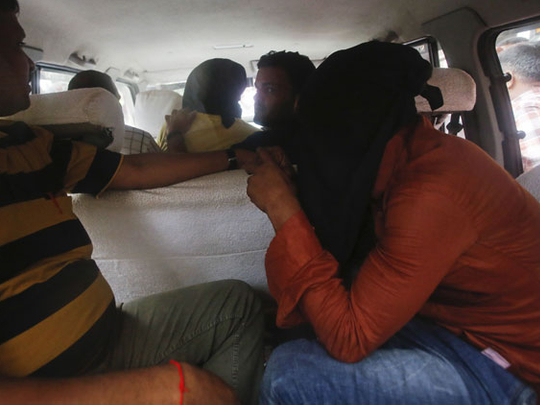
New Delhi: Another gang rape. Another round of discussions. The nation’s conscience shaken once again. More protests take place.
The National Crime Records Bureau (NCRB) has even more horrifying statistics to share. It states: “Every 20 minutes, a woman is raped in India.”
So, do we need to at all ask whether women feel safe anywhere in the country? The mere question is met with shock and awe. Some teens this correspondent spoke to responded by countering if it was some kind of a joke to know if they felt safe.
Aalia, a student said: “The Mumbai photo-journalist was dressed decently. She was out working in the evening and not late in the night.
“She was escorted by a male colleague. We have strong laws also now post the December 16 gang rape case in Delhi. So, what more is expected of us?
“I do not feel safe at all because darkness is prevailing everywhere behind the limelight and glamour of the city. Girls are being raped and harmed. People are full of lust and modernisation is limited to only the materialistic world, but mentally most men are perverts.”
Honey, a financial manager responds: “Today we talk of technology, about modernisation, about India moving forward and trying to compete with the developed countries. But look at our thinking. We only end up making a joke of ourselves in front of other countries, when they issue guidelines for tourists.
“Yes, like all, and I emphasise ‘all’ women, without exception, I feel unsafe in Delhi. And I think for women it will now become a dream to walk freely anywhere in the country.
“Forget about night, one feels scared venturing out even during daytime. I feel it is not just our system but also its rotten laws that are responsible for a woman’s predicament today.”
With the increasing number of rapes in the country, activists are pondering over the immense need to address the issue of rape in a more powerful manner that goes beyond protests.
But Adeeba, a student, feels dejected. “Such talks take place when the media takes up a case, but again it is back to square one. My situation is similar to any other girl.
“The moment I step out of the house, people glare; no matter what clothes I am wearing. They pass lewd comments, but I listen to them without retorting, only because I am afraid, they may retaliate later with something more drastic.”
Many women wondered why Bollywood was being held responsible for the rapes. They felt that films were a medium of entertainment and people go to watch them to unwind.
“If this were the case, we are yet to discover people who became patriotic overnight after watching a patriotic film,” Usha said.
“I think it would do well for all Indian women to now take the opportunity into their hands and work in unison. We need to show to the political parties that we are made of sterner stuff.
“And would vote for only those who promise to make laws wherein rapists are given exemplary punishment and not just prison sentence.”
Kanta, a resident of Mumbai says: “Films in the ‘60s and ‘70s also carried rape scenes. But such unpleasant incidents happened rarely. Films only depict what happens in society and not the other way round.
“All we demand now from the lawmakers is to punish the rapists publicly. They should first be caned publicly and then sent to the prison. And we don’t want this nonsense about a juvenile, who is adult enough to rape, but treated as a minor when it comes to punishment. Only in India men can get away by framing such atrocious laws.”












